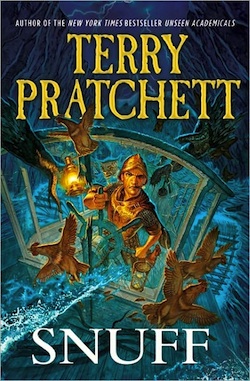If you’ve read Terry Pratchett’s books before, then all you need to know about Snuff, the thirty-ninth Discworld book, is that it’s the next Sam Vimes novel, it is about as good as the last Vimes book, Thud (2005), and if you liked Thud, you’ll like Snuff.
If you haven’t read any books in the long running fantasy/satire series before, then you should know that Snuff is an entertaining parody of Agatha Christie-esque mysteries, set in a world where the oppressed underclass are in fact goblins. Series mainstay Samuel Vimes, Commander of the Ankh-Morpork City Watch, has been forced to take a vacation in the country and stumbles on a conspiracy of smugglers, slavers, and murderers.
The humor is sharp and the characters are charming, and the plight of the goblins creates moments of genuine pathos that are the highlight of the book. However, the central mystery lacks tension, and the book relies too much on audience’s previous familiarity with Vimes, which means that while I enjoyed the book, I wouldn’t recommend it as anyone’s first trip to Discworld.
That’s actually unusual for a Discworld book. Despite the long publication history and large cast of characters, almost every other Discworld book can be read as a standalone. In fact, 2009’s Unseen Academicals, a retelling of the invention of collegiate sports, and also there is an orc, featured an almost entirely new cast and could easily be read on its own, and Unseen Academicals is one of my favorite books in the whole series.
Snuff, on the other hand, is entirely about Vimes, who has risen over the course of previous books from lowly guard to Duke of the City, and must now adjust to being a noble. To understand Vimes discomfort with nobility and the countryside, one would have to have read the books that show how much Vimes identifies with the streets of Ankh-Morpork. Furthermore, Vimes picked up a demonic presence in the climactic chapters of Thud which returns, unexplained, so if nothing else you’d have to read Thud to understand what’s happening here.
That said, if you’ve read the previous Vimes books, you will enjoy Snuff. Discworld is an absurd world full of dwarfs, trolls, and wizards that act like merchants, punks, and academics, and where six inch tall men are the most feared fighters in the world. Vimes’s bafflement with country living, full of animals, and animal poop, is hilarious, as are his encounters with the local population of nobles (Jane, the budding author, who would be the family scandal if her sister Hermione wasn’t a lumberjack), peasants (Chief Constable Feeney, the only law in the shire, as long as his old mum lets him out of the house) and, um, other, (Stinky, the rebellious goblin who may be the smartest person around, or may just be crazy). Vimes’s discomfort with being suddenly respected is a source of constant humor, and may also reflect Pratchett’s own feelings of being knighted in 2009, though Pratchett celebrated that by forging a sword out of meteorites, because Terry Pratchett is a BAMF.
Beyond the trademark absurdity of the Discworld books, Snuff also contains some heartwrenching moments as it explores the world of an oppressed minority through the goblins. Treated as vermin by most of Discworld, the goblins have internalized their oppressed state through their culture and religion. Therefore, the scene where the goblins ask, not demand or beg, but simply ask, for justice for the murder of a girl becomes an act of incredible courage, and the final scene of a goblin playing a harp and changing the world is genuinely moving.
As someone who has read the previous Vimes novels, my complaint is that, while plot has never been the draw of a Discworld novel, the mystery here is particularly lacking. It’s obvious from the beginning to both Vimes and reader who (the nobles) did what (enslaved the local goblins) and why (as part of a drug smuggling ring). Even when a relentless murderer comes after Vimes and his family, it never feels like anyone’s in real danger. The most tension comes from whether Vimes will give in to the demon in his brain that allows him to see crimes in the dark but demands bloody vengeance, but in the end Vimes does what he always does, follow the law and allow other people to deliver the necessary retribution, leaving the issue of the demon unresolved.
Other than that, Snuff is a fun addition to the Discworld series that introduces interesting new characters and concepts to the already rich world. While not a stand out work, Discworld fans will be happy to have another adventure with Sam Vimes. Non-Discworld fans will have, well, something to look forward to when they start with a different book in the series. I’d suggest Guards, Guards.
Steven Padnick is a comic book editor. By day.










